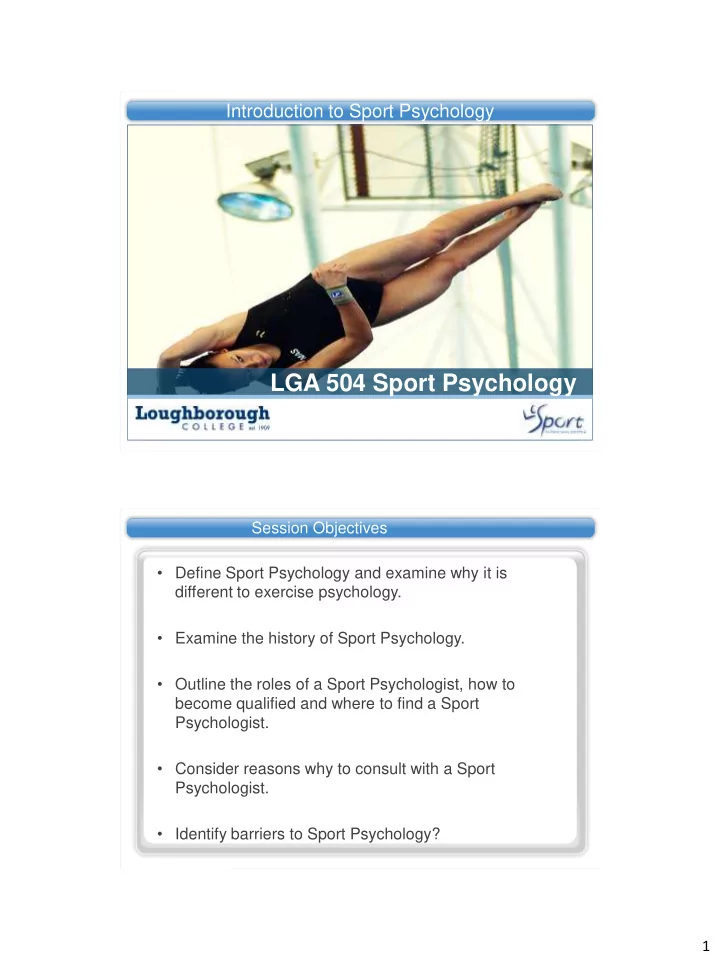

Introduction to Sport Psychology LGA 504 Sport Psychology Session Objectives • Define Sport Psychology and examine why it is different to exercise psychology. • Examine the history of Sport Psychology. • Outline the roles of a Sport Psychologist, how to become qualified and where to find a Sport Psychologist. • Consider reasons why to consult with a Sport Psychologist. • Identify barriers to Sport Psychology? 1
Defining Sport Psychology “The application of psychological knowledge to enhance personal development and performance of individuals within sport.” C c Vealey and Garner- Holman (1998) An Exercise Psychologist looks at….. • The study of behavioral factors that influence and are influenced by participation in exercise and physical activity. • The application of the knowledge gained through this study to everyday settings (e.g., fitness and wellness settings, counseling, performing arts). • The study of how participation in sport, exercise and physical activity may enhance personal development, well-being and mental health over the life span. Weinberg and Gould (2007) 2
A Sport Psychologist looks at……… • The study of behavioural factors that influence and are influenced by participation in sport. • The application of the knowledge gained through this study to everyday settings . (e.g. amateur and elite sport, sports medicine, athletics, counseling). Weinberg and Gould (2007) PROPERTIES Allow user to leave interaction: Anytime Show ‘Next Slide’ Button: Show always Completion Button Label: Next Slide 3
PROPERTIES On passing, 'Finish' button: Goes to Next Slide On failing, 'Finish' button: Goes to Next Slide Allow user to leave quiz: At any time User may view slides after quiz: At any time User may attempt quiz: Unlimited times PROPERTIES Allow user to leave interaction: Anytime Show ‘Next Slide’ Button: Show always Completion Button Label: Next Slide 4
Where can you find a sport psychologist ? • Private practice • University and College counseling centers and athletic departments • Sports medicine centers • Elite sports academies • BASES website – consultant finder PROPERTIES Allow user to leave interaction: Anytime Show ‘Next Slide’ Button: Show always Completion Button Label: Next Slide 5
Applied Sport Psychology British Association of Sport and Exercise Sciences (BASES) Accreditation British Psychological Society (BPS) Chartered Status Association for the Advancement of Applied Sport Psychology (AAASP) certification Health Professions Council (HPC) Regulation Why would clients seek the services of a sport psychologist ? • Optimise performance. C • Overcome obstacles and reach full potential. • Adopting and /or maintaining a mental skills training program • Facilitate efficient/healthy functioning of sport or other teams C 6
Barriers to Sport Psychology Lack of understanding in popular press leads to criticism of the field. “There is a stigma attached to sports psychologists ever since Glenn Hoddle used faith healer Eileen Drury to try to strengthen the minds of the England players before they went out to play important games.” (Oxford Mail, 2000) • Eileen Drewery is NOT a sport psychologist Implications associated with a ‘new’ field • Journal articles • Definitions • Academic agreement/disagreement • Moving forward • Applying the theory • Psychologists having to overcome barriers before they work with players in terms of highlighting benefits 7
PROPERTIES Allow user to leave interaction: Anytime Show ‘Next Slide’ Button: Show always Completion Button Label: Next Slide References BASES (2010) BASES information . Available at: http://www.BASES.org.uk (Accessed: June 2010). Vealey, R. S. and Garner- Holman, M. (1998) ‘Applied Sport Psychology: Measurement issues’. In Duda, J. L. (ed.) Advances in sport and exercise psychology measurement , Morgantown, WV, Fitness Information Technology, pp.433-446. Weinberg, R. S. and Gould, D. (2007) Foundations of Sport and Exercise Psychology . 4 th edn. United States: Human Kinetics. 8
Recommend
More recommend